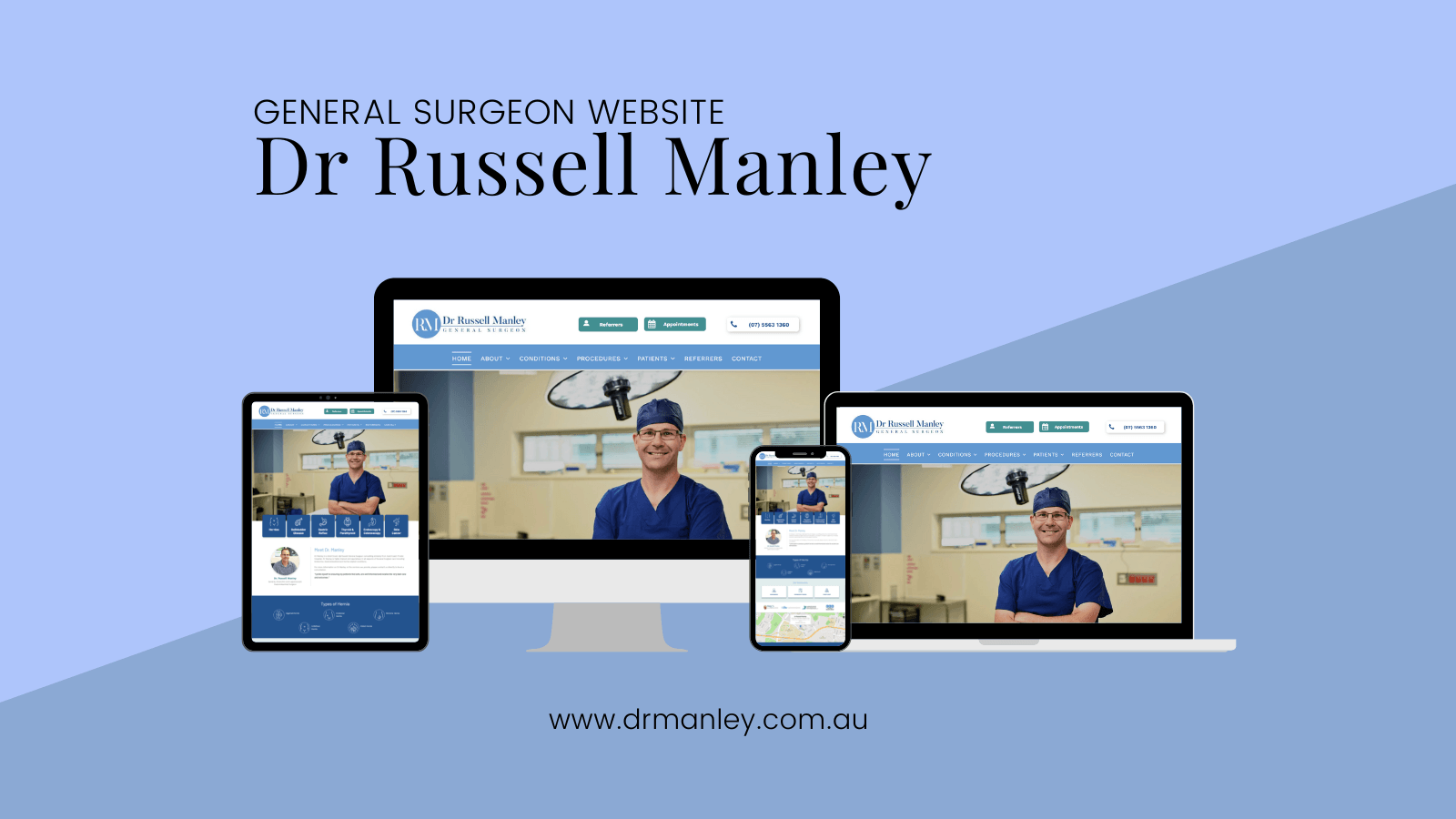Best Doctor Websites: Top Picks for Medical Professionals
Discover how to improve your medical practice website design, optimize patient experience, and strategically propel your practice's growth with search engine optimization for doctor websites and landing pages on general medicine websites.
Understanding the Importance of a Well-Designed Medical Practice Website
Undeniably, the role of landing pages in enriching patient experience on medical websites must be considered. Web design is crucial in content marketing and providing relevant health information. An inherently usable and attractive website, including well-designed landing pages, can be pivotal in shaping patient satisfaction and attracting potential patients. This is especially important in content marketing for doctor websites, where a strong online presence can give your medical practice an edge.
Furthermore, a well-crafted doctor website design propels your medical practice's brand recognition, allowing you to stand out among other doctor websites. This online reputation is vital for a good doctor's website.
- Effective navigation: Simple and intuitive menus enhance user experience and seamless browsing.
- Professional aesthetics: A less cluttered design and appropriate use of colours convey professionalism, nurturing trust amongst visitors.
- Responsive web design: This ensures your site remains functional and visually appealing on various devices, broadening your patient reach.
- Consistent brand identity: A uniform layout and color scheme throughout the platform echoes brand consistency, fortifying your professional image.
Researching Your Target Audience
A critical first step in Medical Practice Website Design is understanding your target audience - patients, physicians, and doctors. Knowing the target audience's demographics, needs, and preferences dramatically influences medical websites' design, functionality, and content. This understanding is crucial for providing relevant and accurate medical information and facilitating effective medical care.
- Conduct patient surveys to gather information about their demographic and behavioural patterns.
- Use web analytics tools to understand the source and behaviour of website traffic.
- Create patient personas to visualize a typical patient profile.
- Understand patients’ common medical issues to design content targeting those problems.
- Engage with your patients regularly on social media - this is a great way to gather insight into their likes, dislikes, and preferences.
Defining Your Website Goals
Before diving into the design process of medical websites, it's important to articulate and prioritize the goals that will effectively target the audience and drive successful marketing campaigns. Clear, well-defined goals anchor your website's design and ensure all elements contribute towards desired outcomes in marketing. Websites are a valuable resource for ads and can greatly enhance your marketing efforts.
- Establish a primary objective - improve patient acquisition, educate about services, or boost online bookings.
- Set measurable targets - percentage increase in web traffic, number of new patient sign-ups, or decrease in appointment no-shows?
- Prioritise the goals according to their pivotal role in your overall strategy.
Choosing a User-Friendly Content Management System
An efficient Content Management System (CMS) is the backbone of high-performing medical practice websites for doctors and physicians in the health industry. It streamlines website administration, marketing, and content updates, enhancing productivity and web performance. This resource is essential for managing websites, ads, and marketing effectively.
Embracing a user-friendly CMS simplifies website management and plays a significant role in website SEO. It ensures that ads and medical information are easily accessible resources for users. It helps easily implement web accessibility and SEO strategies for doctor website design and provides a seamless user experience for websites with ads.
- Ease of use for non-technical staff
- Built-in SEO features
- Integrations with patient management systems
- Scalability to grow with your practice
- Security and privacy measures
- Real-time platform updates and improvements
- Community support and regular maintenance
Creating the Medical Practice Website Design
Designing the right websites for medical practices can significantly impact patient experience. Physicians and doctors must focus on creating informative websites to provide relevant information. Consider mobile-friendly elements to optimise access for doctors and physicians on your s across all devices. Ensure that the websites are designed to accommodate ads as well.
- Impact on patient experience: an appealing, intuitive template can help keep visitors engaged and positively influence their perception of your medical practice.
- Mobile compatibility: Ensure your site is user-friendly on all devices, expand your reach and improve patient convenience.
Optimising Your Website for Search Engines
To draw more patients online, employing effective SEO for doctor website design remains pivotal for doctors. Web accessibility is also crucial for websites to ensure all users can easily access the information they need. This entails optimising web accessibility, ads, and content, following search engine norms, and building niche authority for doctor website design and medical websites.
An optimised medical website using strategic SEO techniques can significantly increase patient outreach and enhance the digital visibility of doctors' practices. By incorporating targeted keywords and optimizing ads, doctors can attract more patients and improve their online presence.
Navigating the complexities of website optimization is necessary for improving visibility within the medical industry for doctors. Strategically placed keywords, clean coding, and high-quality backlinks are crucial for web accessibility and doctor website design. These SEO strategies are especially important for medical websites and doctors.
Conducting Keyword Research
In SEO, keyword research is vital for medical website owners and doctors. It helps optimise the doctor's website design and improve medical information's visibility. The foundation drives organic traffic to your doctor's website, making your medical practice more visible online.
Understanding the phrases your potential patients use in their online search assists in crafting content that resonates with them on your medical or doctor's websites. Keyword research gives insights into what your audience seeks on a medical website.
Start by brainstorming the terms your patients might use for your medical website services. Consider including common problems, treatments, and diseases relevant to your practice on your site. Include them in your keyword list.
Use advanced SEO tools like Google's Keyword Planner to help identify popular search terms, search volume, and competition level and optimize your site.
Adopt long-tail keywords on your site, which are more specific and often less competitive. For instance, instead of 'surgeon,' utilise 'cardiovascular surgeon in North Sydney.' This drives more targeted traffic to your site, increasing patient appointments.
Implementing On-Page SEO Techniques
On-page SEO strategies considerably enhance a medical practice's online visibility on the site. Proper utilization of this tool enhances the reach and ranking of the site for relevant search terms.
When properly utilised, metadata, including title tags and meta descriptions, is pivotal in optimising the content's relevancy to search engines. This is especially true for site optimization. This is especially true for site optimization. This is especially true for site optimization. This is especially true for site optimization. Notably, these elements appear on the site and in search results, influencing click-through rates.
Addressing the keyword density, placement in site content and headers, and using alt tags for images on the site is vital. Such attention to detail guarantees your website is comprehensible and SEO-optimized for search engine algorithms.
Internal linking, an often overlooked strategy, bolsters your site's SEO. By seamlessly integrating relevant links to other pages on your site in content, search engines perceive your site as a knowledgeable information hub.
Creating SEO-Friendly URLs
Elevate your SEO game with URL optimisation. SEO-friendly URLs facilitate easy crawling for search engines, effectively pushing your medical practice website up in rankings.
These URLs play a crucial role in enhancing your website’s discoverability. With strategic keywords related to the medical field or your specialty, URLs become a potent tool in optimizing your site for search engines.
Designing a Clear and Intuitive Navigation Menu
A well-designed navigation menu on your site is crucial to patient satisfaction, ensuring users can easily locate essential information, initiate appointments, and explore your services without frustration. Implementing strategic enhancements on a site can lead to an optimal patient experience.
- Create clear, descriptive labels for each navigation tab
- Ensure each primary navigation tab has relevant submenu items
- Use simple language that your audience can easily understand
- Place the most critical information (like 'Services', 'Contact Us', 'Book an Appointment') in a prominent position
- Consider including a search bar for quicker access to specific content
- Minimize the number of menu items to avoid overwhelming the user
- Make sure your navigation menu is responsive and functions well across different devices
Showcasing Your Services and Specialties
To stand out in the medical field, showcasing your unique services and specialties on your website is essential. This strategic differentiation through specialisation helps site visitors understand what distinguishes your practice. Moreover, investing in detailed content about your medical specialties can significantly boost trust and engagement on your site.
This information answers patients' queries and establishes your site as a reliable resource. It's a powerful way to demonstrate your expertise and commitment, dramatically enhancing your reputation and credibility regarding your medical acumen.
- Elucidate each service offering with comprehensive details.
- Delineate your unique approach for each medical specialty.
- Communicate how your services address patient needs and concerns.
- Demonstrate your knowledge and skills through well-researched content.
- Provide patient testimonials explicitly tied to your specialties.
Incorporating Compelling Visuals
Compelling visuals are essential in enhancing the appeal of your medical practice's website. They aid in effectively conveying information, improving patient retention, and creating distinct, memorable impressions.
- Choose high-quality, relevant images that accurately represent your practice.
- Use infographics to simplify complex medical information.
- Incorporate educational videos to understand your services further.
- Utilize professional photos of your medical team to foster trust.
- Optimise your visuals for fast loading speed.
Integrating Online Appointment Scheduling
Online appointment scheduling is pivotal in providing a seamless patient experience and boosting conversion rates for any medical practice website. A well-integrated online appointment module is a true catalyst of usability and user experience.
- Efficient appointment navigation: Directing users to book appointments using clear and intuitive pathways.
- 24/7 availability: Allowing patients to schedule appointments anytime, anywhere.
- Automated confirmations and reminders: Ensuring patients receive automatic email or SMS confirmations and reminders about their upcoming appointments.
- Customizable appointment slots: Offering the ability to tailor appointment times according to the availability of doctors.
- Integrating with patient records: Automatically updates patient profiles with their appointment history.
- Cancellation and Rescheduling: Offering an easy way for patients to cancel or reschedule appointments.
- High-level website security: Safeguarding patient information during the appointment scheduling and management process.
Adding Testimonials and Reviews
Patient testimonials and reviews should be crucial to your medical practice website. They build credibility and instil trust in potential patients, making them pivotal tools in your online reputation management.
- Leverage social proof by featuring genuine patient testimonials on your website,
- Maintain a dedicated section for patient reviews to build a robust online reputation,
- Encourage patients to provide feedback after their visit to gather new testimonials continually,
- Craft trust and loyalty by responding to the feedback, both positive and negative, and
- Integrate review platforms like Google, Yelp, or Healthgrades to increase credibility.
Attract More Patient Reviews
To attract more patient reviews for your medical practice, consider implementing the following strategies:
- Provide an Exceptional Patient Experience: Deliver outstanding care and service to patients, exceeding their expectations. When patients have positive experiences, they are more likely to leave reviews.
- Make it Easy for Patients to Leave Reviews: Streamline the review process by providing multiple platforms for patients, such as your website, social media pages, and popular review sites like Google My Business or Healthgrades.
- Request Reviews at the Right Time: Ask patients to leave a review when they are most satisfied with their experience. This could be immediately after a successful appointment, upon receiving positive news regarding their health, or upon completing a successful treatment.
- Send Follow-Up Emails: Send personalized follow-up emails to patients thanking them for choosing your practice. Include a request for a review and provide direct links to your preferred review platforms for their convenience.
- Display Testimonials and Reviews: Showcase positive patient reviews and testimonials on your website and social media channels. This adds credibility to your practice and encourages other patients to leave their feedback.
- Offer Incentives: Consider offering small incentives, such as a discount on future services or a chance to win a gift card, to patients who leave a review. However, be mindful of the ethical guidelines and regulations in your jurisdiction.
- Engage with Reviews: Respond promptly and professionally to positive and negative reviews. Show appreciation for positive feedback and address any concerns or issues from negative reviews. This demonstrates your commitment to patient satisfaction.
- Train Staff on Requesting Reviews: Educate your staff on the importance of patient reviews and provide them with guidelines on how to request reviews in a friendly and non-intrusive manner.
Always follow ethical guidelines and patient privacy regulations when soliciting and using patient reviews. Encouraging honest and genuine feedback will help build trust and attract potential new patients to your medical practice.
Ensuring Mobile Responsiveness
Mobile responsiveness in medical website design isn't a luxury; it is imperative. It's about delivering a seamless user experience that resonates with the growing number of tech-savvy patients accessing health information and services via mobile devices.
Today's patients demand quick, easy, and efficient online interactions with their healthcare providers. A mobile-friendly design for your medical practice website ensures you meet this demand while creating an engaging, patient-friendly digital environment.
- Adapt site layout to various screen sizes and orientations
- Optimize images and multimedia to load quickly on mobile devices
- Implement a mobile-friendly appointment booking system
- Ensure that site navigation is effortless on mobile devices
- Routinely test your website on various mobile devices and browsers to ensure optimal performance.
Trusted Source for Global Health: Online Resources for Medical Professionals
As a medical professional, it is essential to have access to reliable and up-to-date online resources for global health information. Quantum Digital & Your Practice Online are trusted sources of resources and provide valuable insights and resources, including:
- Clinical information, including general health information for professionals and patients covering medical conditions, medical diseases, physical disorders, and trauma,
- Diagnostic information, including modalities, processes and clinical guidelines,
- Treatment information, including non-surgical and surgical treatments, specific procedural overviews,
- Medical Summaries, including comprehensive information on various health topics, disease prevention, disease research, guides, comparison tables, and pathways
Remember to critically evaluate the information you find online, considering the content's source, relevance, and currency. It is always recommended to consult with colleagues, attend conferences, and refer to local guidelines and protocols in addition to online resources.
Incorporating Secure and Compliant
Integrating secure, HIPAA-compliant features is pivotal to any medical practice website. It showcases your commitment to patient data safety and promotes trust, paving the way for improved patient interaction.
- Employing encrypted forms to ensure secure patient data transmission.
- Adding a privacy policy outlining your commitment to data security.
- Implementing SSL certificates to indicate a secure connection.
- Using secure hosting services is known for their compliance with HIPAA security standards.
- Displaying recognisable security badges to enhance patient trust.
Regular Website Performance & Reporting
Monitoring your medical practice website's performance is pivotal in advancing service delivery. It helps identify and rectify technical glitches, facilitating seamless user experience and elevating the medical practice's reputation.
Properly analysing collected data is critical for optimal website performance. Effective analytics can reveal insightful usage patterns and visitor preferences, helping adapt your site, thus driving conversions, boosting patient growth, and fostering overall medical practice growth.
Tracking Website Traffic
Website traffic monitoring holds immense significance for productive website management; for a medical practice, tracking visitor trends can reveal engagement levels and areas for improvement. This information guides strategic adjustments, underscored by data, that enhance user experience and patient satisfaction.
The meticulous website traffic tracking can notably optimise patient engagement, a crucial contemplation pertinent to medical practices. You can refine content, services, and overall website structure to increase patient interest and retention by identifying what resonates best with your audience.
Analysing Website Visitor Behavior
Analyzing user behaviour plays a significant role in refining medical practice website designs. It demystifies the unique preferences of patients, enabling us to create more engaging and user-centric designs.
Knowledge of user activity can help identify the sections or services of the website most appreciated by patients. Such insights can direct the redesigning process for better user engagement.
Insights drawn from user behaviour analysis can be instrumental in devising an effective SEO strategy. The information about users' interests can prioritise certain webpage content and elevate visibility in search results.
A comprehensive study and regular user behaviour monitoring can significantly increase patient reach and practice reputation. Knowledge about patient footprint reveals popular keywords and top content areas to focus on.
Patient behaviour analysis reflects patterns and trends. By reacting to these trends in real time, you can offer a tailored user experience. It enhances content promotion and maximises website visibility, boosting patient reach.
Regular Website Updates
In the digital landscape, a healthful pulse of your website depends on meticulous and consistent maintenance. Alongside avoiding potential downtime, updating your content regularly puts your practice in the spotlight, fostering a deeper engagement with your patients.
- Regularly check and update medical information to ensure it complies with the latest standards and protocols.
- Revise your practice’s operational details, such as a new office hour schedule or location, as changes occur.
- Replace outdated imaging and visuals with fresh, high-resolution images.
- Keep a check on broken links or inefficient web pages and fix them immediately.
- Update patient testimonials and reviews regularly.
- Ensure your website's security features are up-to-date and compliant with current regulations.
Implementing a Well-Designed Contact Form
Investing time in implementing a well-designed contact form on a medical practice website dramatically increases patient communication and engagement. The design and responsiveness of your contact form can directly impact the willingness and ease for patients to interact, maintaining connection long after consultations.
- Identifying mandatory and optional fields
- Designing error messages that are clear and polite
- Providing an automated confirmation message or email
- User-friendly form layout
- HIPAA-compliant transmission of patient data
- Options for patients to specify the nature of their query
Incorporating Social Media Integration
Integrating social media into your medical practice website design can broaden your patient reach. Social media buttons promote engagement and help establish a more visible online presence.
Social media integration allows for patient testimonials, discussions, and content sharing, enhancing your practice's visibility. Patients who interact with your social media will likely share your content with their followers, inciting a domino effect.
- Incorporate social media buttons for popular platforms like Facebook, Instagram, Twitter, and LinkedIn.
- Ensure these buttons are easily visible and accessible on all site pages.
- Keep your social media accounts active with regular posts, engaging content, and prompt responses.
- Use social media to share positive patient testimonials, news updates, and informative articles.
- Promote online appointments and specific services via social media.
Partnering with a Professional Web Design Agency
In the complex digital health landscape, a professional web design agency is invaluable for medical practices, bringing expertise in design, user experience, and SEO. They navigate the intricacies of health-related web requirements to ensure the optimal performance of your site.
By allowing a web design agency to streamline your online presence, your medical practice's website becomes a robust tool that promptly addresses the needs of your current and potential patients. Leveraging their expertise can significantly improve your website's user experience and overall effectiveness.
- Expertise in responsive web design that caters to your patients' needs.
- Implementing SEO techniques tailored specifically for medical practices.
- Navigating the complexities of HIPAA-compliant features.
- Benchmarking and monitoring your site's performance metrics.
- Ensuring mobile-friendliness to expand reach.
- Incorporating advanced features like online appointment scheduling.
- Routine website maintenance to uphold its functionality.FAQ
Medical Website Design: Frequently Asked Questions
What is Medical Practice Website design?
Medical practice website design refers to creating and optimising websites specifically tailored for medical professionals, clinics, and hospitals.
Why is it essential to have a well-designed medical practice website?
A well-designed medical practice website is crucial as it serves as a digital representation of your practice, providing patients with essential information, enhancing your online presence, and improving patient engagement and trust.
What key elements should be included in a medical practice website?
A successful medical practice website should include clear and concise information about your practice, services offered, contact details, appointment scheduling, patient testimonials, and educational resources.
How can an optimised website design benefit my medical practice?
Optimising your website design can improve its visibility on search engines, attract more potential patients, increase website traffic, enhance user experience, and ultimately grow your medical practice.
Can I design my medical practice website myself?
While it is possible to design your medical practice website yourself, it is recommended to consult with professional web designers who specialise in medical practice website design to ensure a polished and user-friendly website that aligns with industry standards.
How can I incorporate SEO into my medical practice website design?
To incorporate SEO into your medical practice website design, focus on using relevant keywords, creating high-quality content, optimising page titles and meta descriptions, improving website speed, and ensuring mobile responsiveness.
What should I consider when choosing a web design agency for my medical practice website?
When choosing a web design agency for your medical practice website, consider their experience in the healthcare industry, portfolio of previous medical website designs, client reviews and testimonials, pricing, and the ability to provide ongoing support and maintenance.
How long does it take to design a medical practice website?
The time it takes to design a medical practice website varies depending on the project's complexity. It may take several weeks to a few months, considering factors such as design customisation, content creation, and revisions.
How much does it cost to design a medical practice website?
The cost of designing a medical practice website can vary depending on the project's scope, features required, customisations, and the web design agency you choose. It is best to get quotes from multiple agencies and discuss your specific needs to determine an accurate cost estimate.
How can I maintain and update my medical practice website after launching it?
After launching your medical practice website, you can maintain and update it by regularly adding fresh content, optimising for SEO, monitoring website performance, addressing technical issues promptly, and partnering with a web developer or digital agency for ongoing support.
Maximising the Potential of Doctor Websites
This comprehensive medical practice website design guide provides valuable information for surgeons, doctors, medical practice marketers, and medical administrators.
It covers the importance of well-designed websites, key elements, optimisation benefits, DIY website design considerations, incorporating SEO, choosing a web design agency, time and cost factors, and maintaining and updating the website post-launch. It offers a concise FAQ section addressing common medical practice website design questions.









